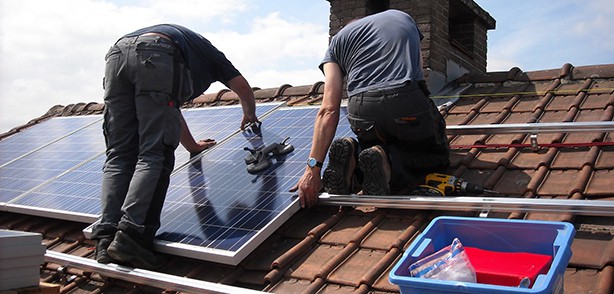June 20, 2022
Solar Energy Pros and Cons: How to Power Your Small Business
Although it has several benefits, solar energy isn’t a good fit for every business. It’s expensive to set up, and it can be hard to find a trustworthy installer. The switch might not be worth it if your electric bill is low.
Keep reading to learn more about the pros and cons of solar energy.



The Importance of Solar Energy
Solar energy is one of the best available energy sources for the environment. Other methods of producing electricity, such as coal and natural gas, have long-term impacts on the earth. Those methods lead to carbon dioxide emissions, which contribute to climate change. Solar energy, on the other hand, is abundant, renewable, and sustainable. The sun is the most abundant source of energy on earth. The energy produced is more than 10,000 times the world’s energy usage. Unlike fossil fuels, which will eventually run out, sunlight is entirely renewable. Over the past decade, the cost of solar power has fallen by 70 percent. Updates to solar panel technology have resulted in more efficient systems. Meanwhile, public support for solar continues to increase.The Pros of Solar Energy
What are the pros and cons of solar energy? Let’s start by reviewing the benefits of solar panels. There are some significant advantages to using solar energy. It can help you lower costs and increase your business’s value. You can attract customers and employees who care about sustainability as you help protect the environment. Large companies, including Target and Walmart, enjoy solar power’s pros. A growing number of small businesses are exploring them as well.
1. Lower Electric Bills
By switching to solar energy, you will likely see significant savings on your bills. Some businesses see a reduction in energy costs of 75 percent or more. One study found that the average owner of a commercial property paid $2,000 per month for electricity. Survey respondents who installed rooftop solar panels paid just $500 a month. Once you’ve paid off the cost of purchasing and installing solar panels, your energy is essentially free. The only exception is when there’s not enough sunlight to generate power, such as on overcast days. At those times, you can use regular electricity as a backup. Businesses located in sunny climates are likely to see the most savings. Battery systems are now available that allow energy to be stored for use when it’s cloudy or dark. However, they can be expensive.2. Improve Business Value
Today, many consumers consider the environmental impact of their shopping habits. Solar panels are one way to show that you’re committed to sustainable business practices. Mentioning your solar panel system in marketing materials and social media posts can be a savvy move. Investing in solar energy may also attract talented employees who care about the environment. A 2019 survey asked workers how sustainability influenced their job search. 70 percent of respondents said they were more likely to work for a company with a solid environmental strategy. One out of every ten workers said they would take a pay cut to work for an environmentally responsible business. If you decide to sell your business, installing solar panels can be a significant selling point. A buyer won’t have to install panels personally and can enjoy savings immediately.3. Reduce Carbon Footprint
A carbon footprint is the amount of greenhouse gas produced by an activity. It’s usually expressed as the number of tons of carbon dioxide (CO2) the action generates. The average small business makes between 11.6 and 23.3 tons of CO2 annually. These CO2 emissions are directly linked to climate change. Solar panels reduce your carbon footprint because they produce energy without creating emissions. The manufacture and transport of solar panels create carbon dioxide, so the panels aren’t entirely carbon neutral. Once you’re ready to choose a solar panel installer, ask them about their sustainability practices. Generally, the energy used to make these panels is “paid back” within two to three years. When solar panels need to be replaced, usually after several decades, their components are recyclable.4. Earn Back Money On Investments
Solar electricity systems pay for themselves over time. Estimates vary for how long it takes before you’ll begin saving enough to cover the installation cost. For some businesses, it’s as little as three years. Most solar panel systems last for 25 to 35 years. You can sell excess solar energy back to your utility company in some areas. This process, called net metering, means you could see additional profits from your solar panels. In addition to other savings, you could be eligible for tax credits. Many states offer credits as an incentive to switch to environmentally-friendly solar power. The Solar Investment Tax Credit (ITC) is a federal incentive program. For 2020, the ITC will allow businesses to claim a credit of 26 percent for installing a solar energy system.
The Cons of Solar Energy
While it has several advantages, solar energy doesn’t work for all businesses. If you’re considering installing panels, you’ll need to consider the potential disadvantages of solar energy. The initial cost is one of the main concerns business owners have when considering solar panels. While solar energy eventually pays for itself through lower electric bills, it can take a few years. Aside from the cost, other issues include the type of roof your business has and access to reputable installers.1. Solar Isn't a Universal Solution
Some types of solar panels will work for most roofs. However, depending on your roof type, installation costs may be much higher. A roof with a steep slope will require additional care when installing panels. On the other hand, a completely flat roof may have drainage issues. Rooftop solar panels work best on south-facing roofs. Certain obstructions can get in the way, such as chimneys or skylights. If trees or other buildings surround your roof, your panels won’t get as much sun. You might need to supplement solar energy with another source. If your roof needs repairs soon, installers recommend completing them before installing panels. The cost of roof repairs or replacement, plus the cost of panels, is prohibitive for many businesses. Keep in mind that if rooftop panels aren’t a good fit, there are also ground-mounted panels. However, your property might not have the space to accommodate them.2. Initial Purchase Comes At A High Expense
The cost of solar panel installation varies based on several factors, such as your business’s size and energy needs. Another factor is the type of system you install. The average business’s upfront cost of solar panels is about $18,000 before tax credits. This estimate is based on a price-per-watt model, which many solar companies follow. The average price per watt in 2020 is $2.96. In addition to the panels, design, and installation, you’ll need to consider the cost of solar permits. If you decide to move to a different location, you will unlikely be able to transport your solar panels. You would be looking at another expensive purchase to outfit your new location with panels.3. Lower Electricity Costs Means Lower Savings
Depending on your location and the type of business you run, your electricity bills might already be low. If that’s the case, the savings from solar energy won’t be as significant. It would take longer to offset the initial cost of purchasing and installing solar panels. For some business owners, it’s not worth the high upfront cost. With coal or natural gas energy, you can take steps to lower your bills. You might decide that these measures make more sense than implementing an entirely new energy source. For example, replacing your office equipment with energy-efficient models makes a big difference.4. Difficulty to Find Installers
Working with a reputable installer is crucial when adding solar panels. Improper installation can lead to inefficient panels and may even cause damage to your roof. If your business is in a remote or rural location, it can be harder to find an installer. If there aren’t many options in your area, you might discover that solar companies are charging inflated prices. Or, you might find a reputable option with affordable rates, only to learn that their schedule is completely booked. A legitimate solar installer should be licensed and insured. They should also offer a warranty in case there are issues during installation. Perhaps most importantly, they should have a track record of quality work and happy customers. Finding the best person for the job will take some time and research.